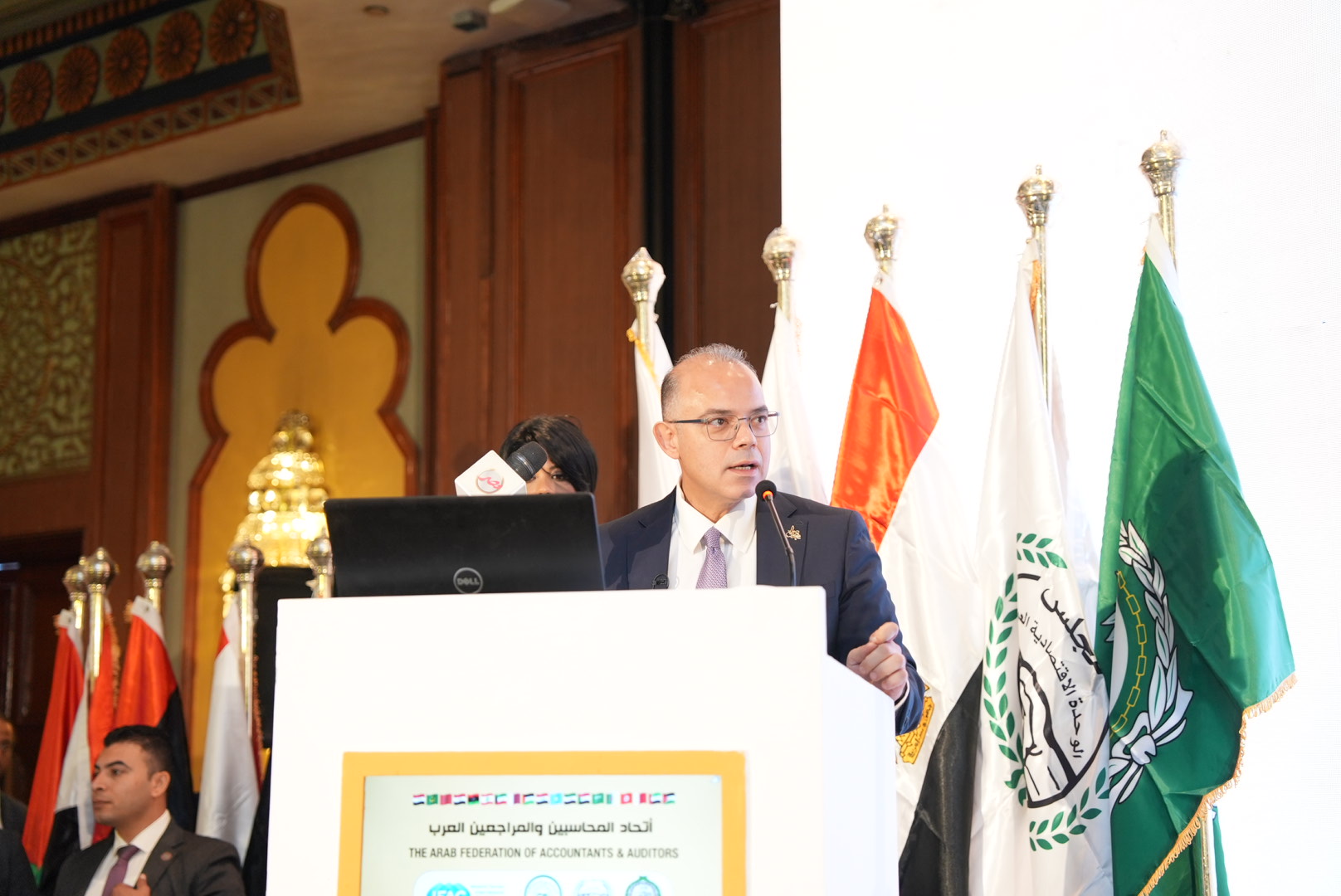Dr. Mohamed Farid – FRA Chairman:
- Global markets are undergoing a rapid shift, redirecting capital toward assets managed strictly according to sustainability standards.
- Egyptian Accounting Standards are aligned with global practices and developments.
- The exceptional development in accounting standards enhances transparency and enables investors to make decisions based on sound foundations.
- Sustainability, financial transparency and digital transformation are essential pillars for achieving comprehensive and sustainable economic growth.
Dr. Mohamed Farid, FRA Chairman delivered a keynote speech at the 12th International Professional Conference of the Arab Federation of Accountants and Auditors, which convened in Cairo under the title “Sustainability, Financial Transparency, Digital Transformation and Economic Development.” He explained that these are essential pillars for achieving progress and together they determine how economies attract investment and how societies achieve inclusive and sustainable growth.
The event was attended by Eng. Mohamed Shimy – Minister of the Public Business Sector, Counselor Mohamed El-Faisal Youssef Ragab, Head of the Central Auditing Organization and Dr. Islam Azzam, EGX Chairman. In addition to, Jawad Ghanem Al-Shihaili, President of the Arab Federation of Accountants and Auditors; Mr. Lee White, CEO of the International Federation of Accountants; Mr. Walid bin Saleh, President of Pan-African Federation of Accountant. That is besides Ambassador Mohammadi Ahmed Al-Nai, Secretary-General of the Council of Arab Economic Unity, number of FRA leaders; experts and heads of international and regional organizations, accountants and legal auditors.
Dr. Farid explained that global markets are rapidly shifting capital toward sustainability-driven assets. This trend is expected to accelerate significantly by 2030, as environmental, social, and governance (ESG) risks become increasingly integrated into the standard financial risk framework.
He added that Egypt’s markets are actively embracing this global trend. Recent notable achievements include the historic first issuance of green bonds and the launch of the first regulated voluntary carbon market. These milestones underscore Egypt’s ambition to become a regional hub for sustainable finance, aligning with global practices and supporting national economic development.
Dr. Farid noted that the accounting and auditing field in Egypt currently faces challenges, primarily relating to updated accounting and auditing standards. Mastering these standards requires significant effort and continuous training for correct practical application.
FRA Chairman proudly affirmed that Egyptian Accounting Standards now align with global practices. He stressed that advanced, continuous training is the cornerstone for professional development, leading the Arab Federation of Accountants and Auditors (AFAA) to collaborate closely with FRA to implement necessary programs and advance the profession in Egypt.
Dr. Farid reiterated that FRA consistently seeks to develop accounting standards, aiming for full integration with international standards. These comprehensive efforts are designed to keep pace with the best global practices and complement the broader reform agenda adopted by the Egyptian government to boost sustainable growth and development.
He asserted that continuous developments are essential, noting that the long-term journey of progress and reform is required to effectively support the national economy.
This development included Egyptian Accounting Standard No. 13 on “The Effects of Changes in Foreign Currency Exchange Rates” to ensure alignment with international standards.
Specifically, on August 15, 2023, the Cabinet issued amendments to IAS 21 “The Effects of Changes in Foreign Exchange Rates,” which requires entities to provide more useful information in their financial statements concerning the exchange rates they use for commercial transactions. The international standard’s amendments mandate that entities estimate foreign currency exchange rates and adhere to related disclosure requirements.
Dr. Farid explained that training and qualifying new professional cadres is essential for creating the next generation of accountants, which will, in turn, guarantee the sustained impact of current reforms. FRA Chairman added that the comprehensive overhaul of accounting standards included critical updates to ensure company financial statements accurately reflect asset value. These updates mandated the introduction of the revaluation model for fixed and intangible assets and the fair value model for real estate investment. Furthermore, FRA amended standards to properly account for exchange rate changes by reclassifying currency differences. Finally, the Authority simplified the rules for auditor registration to welcome more qualified professionals while simultaneously obligating auditing offices to ensure the continuous professional development of their accountants.
Dr. Farid emphasized that Egyptian Accounting Standards are vital for business integrity, allowing companies to accurately report their financial position and operating results. This accuracy provides a sound foundation for optimal financing and investment decisions. The recent comprehensive overhaul notably replaced book value with the fair value method for assets, while also updating rules for real estate investment and equity.
The Prime Minister issued a landmark decree – the first of its kind in Egypt and the region- adding an accounting interpretation to regulate the treatment of carbon credits. This interpretation defines the scope and procedures management must follow, mandating a clear understanding of the credit’s issuance cycle, commercial purpose and how to classify the held certificate as either a financial or intangible asset.
The new accounting interpretation further refines the specific accounting treatment for carbon credits across various scenarios. These rules distinguish between certificates issued to the project owner/developer and those issued to a non-owner developer or financier. Crucially, the interpretation also provides distinct guidance based on the certificate’s intended use: whether it is purchased for carbon offsetting (cancellation) or acquired solely for the purpose of trading.
FRA Chairman explained that current achievements are merely a foundation to build upon, emphasizing that the primary goal is to support the Egyptian government’s efforts to achieve prosperity and progress for all Egyptians.
In his closing remarks, FRA Chairman thanked the Arab Federation of Accountants and Auditors and affirmed the Authority’s commitment to full cooperation with all partners. He stressed that sustainability; financial transparency and digital transformation are not parallel paths but a single, integrated journey toward sustainable economic growth. By effectively integrating these elements, he concluded, “we build reliable markets, more competitive economies and resilient societies – a future we are committed to build together through trust, joint cooperation and fostering innovation.”
Last modified: September 30, 2025
